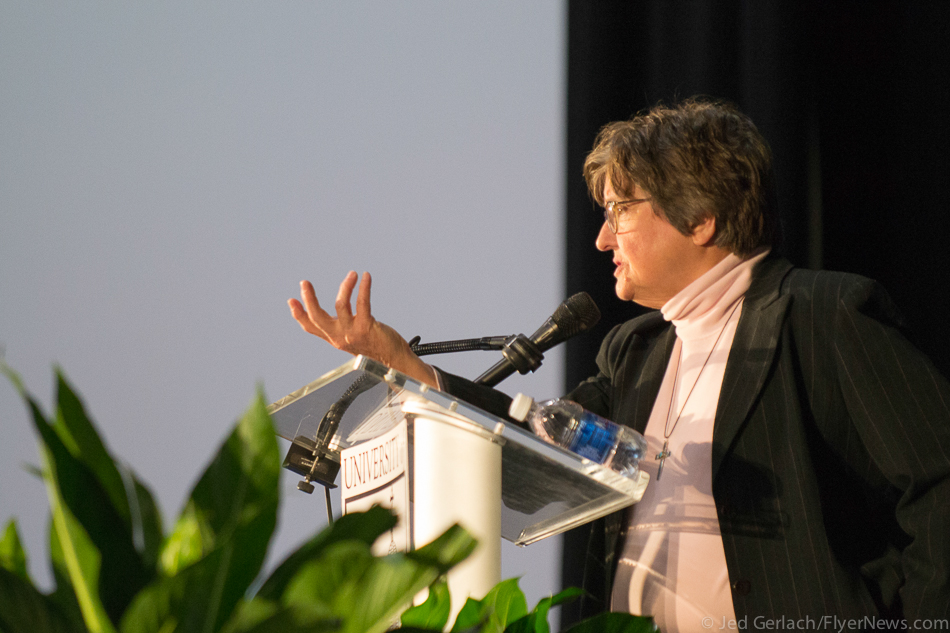Guest speaker aims to abolish capital punishment
By: Emma Creekbaum – Staff Writer
On Feb. 26, distinguished anti-death penalty activist, Sister Helen Prejean, discussed capital punishment in Ohio and her life experiences, on the University of Dayton campus as a guest speaker for the University of Dayton’s Speaker Series.
“Faith and reason” is the premise for the 2014-2015 season of Rites. Rights. Writes. at the University of Dayton, death penalty opponent Prejean spoke to an audience of UD students and the Dayton community on Feb. 26.
The UD public gathered in the RecPlex to witness the “Dead Man Walking” author and death penalty abolitionist Sister Helen Prejean speak about life, death, and social justice. Ohio is one of 32 states with the death penalty in the United States. Since 1885, when executions were carried out by public hanging, the state of Ohio has executed 393 convicted murderers. As of February 2, 141 Ohio prison inmates have been sentenced to death for convictions of aggravated murder, according to the Ohio Department of Rehabilitation and Correction.
In January 2014, an Ohio execution was given with the use of untested lethal injection, after citizens raised questions about the ethics of the punishment. Ohio carried out the first lethal injection in the U.S. using a new protocol, according to the Death Penalty Information Center.
Dennis McGuire, the first man executed using the new injection formula, took 15 minutes to die.
The consciousness of capital punishment McGuire shows us all that the Supreme Court is allowing this, Prejean said.
Ohio had previously used Pentobarbital, an anesthetic, but changed drugs after the supply of Pentobarbital expired and the manufacturer put restrictions in place to prevent its use in executions. A combination of the drugs Midazolam and Hydromorphone were used on McGuire instead.
Prejean said that after the European company Lundbeck cut off the drugs to the U.S., the states have been trying to find other alternatives. “The American Veterina Medical Association pays closer attention and monitors more closely the euthanizing of animals than we are doing with human beings,” Prejean said.
From 1963 until Feb. 18, 1999, no executions in the state of Ohio were performed after revisions to the Ohio death penalty law. Since resuming executions in 1999, 38 inmates have been executed in Ohio, according to the Death Penalty Information Center.
And none of these 38 executions in Ohio involved a white defendant who killed a black victim. At least seven black defendants have been executed for murdering a white victim in Ohio.
“The killing of white citizens, their lives are valued. There is outrage over their death,” Prejean said. “People of color, lives aren’t valued as much because there is no outrage over their death and often some of the murders are not even investigated.”
Geographically, 45 percent of Ohio’s executions have been from three of the state’s 88 counties: Hamilton, Cuyahoga and Summit. These three counties make up about 23 percent of Ohio’s population.
A social justice nun from Louisiana, Prejean said she always had a spiritual side and a desire to help the poor while living at St. Thomas Housing Project in New Orleans.
She told a story about how she was approached to write to a death row inmate, Patrick Sonnier, who was one of two death row inmates Prejean writes about in the 1993 non-fiction novel “Dead Man Walking.”
In the beginning of her time as a spiritual advisor for Sonnier, Prejean said she presumed he was guilty. After writing letters back and forth, she said she would come to visit him in prison.
Upon the last week of Sonnier’s life, Prejean voted against the state of Louisiana, to not kill Sonnier, at a public pardon board hearing.
Prejean said after the viewing of Sonnier’s death a “fire was struck in [her] heart for social justice.”
After this pivotal event in Sister Helen’s life, she became dedicated to putting a stop to capital punishment and is continuing to see it through.
“We have to get rid of this thing,” she said. “We have to get rid of the death penalty.”


